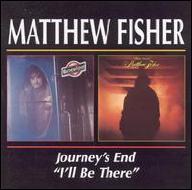Fisher and Trower quickly rose to prominence alongside Brooker -- the guitarist's flashy blues-based playing made him a magnet for fans, and Fisher's prominent organ work also afforded him a spotlight, on their records as well as at their shows. The fact that A Whiter Shade of Pale remained their best-known song for years -- even decades, really -- with its prominent classical organ part, didn't hurt Fisher's profile before the public. Additionally, he managed the all-but-unheard-of feat of breaking the Brooker/Reid monopoly on songwriting credits for the group's releases, receiving sole composer credit for Repent Walpurgis on their debut album. (In later years, he would describe that credit as a "booby prize," in distinctly hostile terms, over his lack of a credit for his contribution to A Whiter Shade of Pale).
As early as the fall of 1967, the music press was reporting that the organist was preparing an album of his own. The latter failed to show up, however, either for that Christmas, or in the year after, or the year after that (although he did show up on the soundtrack to a film called #Separation in 1968). Instead, Fisher played an increasingly prominent role within the band over their second and, especially, their third albums. The latter, A Salty Dog, carried his credit as producer and arranger, and stood in the view of many fans and critics as the group's most ambitious and successful studio project. For all of his increasing influence on the band, however, there was obviously an undercurrent of strain within their ranks -- if one reads more recent accounts of the early history of Procol Harum, especially from Fisher, one finds mentions of resentment below the surface, growing out of the near-total Brooker/Reid lock on the composer's credits for the group's work. And it was soon after the March 1969 release of A Salty Dog that the first major fractures within the band appeared, with Fisher and Knights both exiting. (Oddly enough, both were succeeded by ex-Paramounts member Chris Copping, who initially doubled on bass and organ).
Fisher reportedly began work on a solo album for AM Records soon after, which he abandoned before the end of 1969. He took a break from making music for a couple of years, running a recording studio in England and going to work in the record industry in New York, before finally re-emerging as a performer in the early '70s. His most prominent engagements were both seemingly improbable, playing in the touring band of Jerry Lee Lewis. A little closer to home and his more immediate background, he also served as the producer of Robin Trower's first solo album. Fisher was most visible as a session musician and producer in those years, working with acts such as Prairie Madness and also playing with Screaming Lord Sutch, in addition to becoming part of David Bowie's band the Spiders from Mars. Finally, in 1973, Fisher signed with RCA and released Journey's End, a critically well-received long-player that introduced him as a vocalist and composer, as well as a multi-instrumentalist, playing most of the music on the album himself. He also demonstrated a lighter touch as a songwriter than what listeners were accustomed to from Procol Harum, with some surprising pop sensibilities. The follow-up album, I'll Be There, was recorded almost immediately after, and despite good reviews, neither record made a lasting impression with the public.
Fisher pursued his subsequent solo work intermittently, with two more albums, Matthew Fisher and Strange Days, appearing in the early '80s, interspersed with soundtrack work. In the '90s, however, he re-joined a reconstituted Procol Harum, with which he recorded as well as performing on-stage. In 2004, however, he quit the band once more, and the following year filed a lawsuit against Gary Brooker and the publishers of A Whiter Shade of Pale, claiming that he was entitled to co-author credit and a 50-percent share of the composer's royalties earned by the song. In the course of the trial that followed, it became established that though the song had been composed before he joined the Pinewoods, the familiar organ part and much of the classical feel of the song (as well as the recording) were, indeed, Fisher's creation. He won an initial ruling favoring his claim to credit and a share of royalties, only to see an appeals court throw out the award of royalties, over the issue of the time that had elapsed between the song's publication and his legal action. But in July of 2009, in an appeal to the House of Lords -- the final level of legal appeal in England -- it was ruled that Fisher was entitled to 40-percent of the composer's royalties on revenue generated by the song after 2004. Since leaving Procol Harum, Fisher has made most of his living as a computer programmer. ~ Bruce Eder, Rovi
















